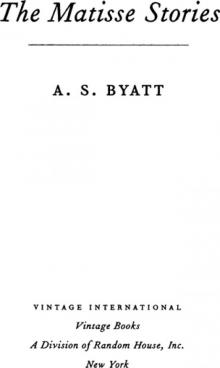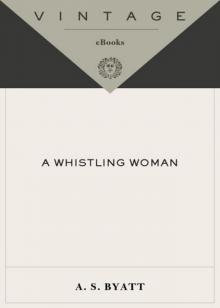- Home
- A. S. Byatt
Babel Tower Page 6
Babel Tower Read online
Page 6
“Why didn’t you, if he was your friend?”
“Well, I would have, I expect, I would have got round to it—”
“Funny he just turned up—”
“Not really. He’d no idea this was where we lived. He was just walking. In the woods, like Leo says.”
“I expect it was nice for you, to see an old friend?”
Frederica looks up, to see what is meant by this placid query. She calculates her answer.
“Of course it was. I don’t seem to have seen any of my old friends for a long time.”
“You miss them,” states Nigel, in the same placid voice.
“Naturally,” says Frederica.
“You should invite them,” says Nigel. “You should feel free to invite them. You should ask them to stay.”
Frederica chooses, after a moment, not to answer this remark. She stares, frowning, into the fire. She says, as placidly as he has been talking, “Are you back for long this time?”
“Does that make any difference? Why don’t you just invite them? Maybe I’ll be here, maybe I won’t. I don’t suppose my presence will affect your reunion.”
“I didn’t mean that. I just wanted to know how long will you be here this time?”
“I don’t know. A few days. A few weeks. Why does it matter?”
“It doesn’t. I just want to know.”
“Well, I don’t know myself. There may be phone calls. Things may come up.”
Frederica, looking into the logs, sees in her mind’s eye a woman stepping barefoot across a bed of cinders, trying to find a path between little smouldering hot places, ready to break out into flames.
“When you go back, I’d like to come with you.”
“Why?”
“Well. We used to do a lot of things together. Dancing, you know, things in town. And I would like to see some old friends, it’s true, I would. I’m thinking, I might look for another job. I need something to do.”
This sentence comes out more tense, less casual, than she meant it to be.
“I would have thought you had a lot of things to do. A child needs his mother near him. There is a great deal here to occupy anyone.”
“Don’t talk to me like that, Nigel. That isn’t the sort of thing you can say to me. You knew what I was when you married me—you knew I was clever and independent and—and ambitious—you seemed to like that. God knows I had nothing else someone like you might be interested in, no money, no connections, I’m not beautiful—all I was was bright and you can’t marry someone for their brains and their—resourcefulness—and then expect them to behave like—”
“Like—”
“Like the sort of girl you might have been expected to marry—but didn’t—one who has always gone hunting and shooting and likes just being in the country.”
“I don’t see why any girl would marry if she can’t put up with being a wife. And a mother. If a girl becomes a wife and a mother, she must expect a few changes, I should think. I would have understood if you hadn’t wanted to take the step. I don’t think I more than half expected you would when I asked you—but you did. I thought you were a resourceful sort of girl. And now all you do is whinge. You have a lovely boy like Leo, and you whinge. It’s not very pleasant.”
Frederica stands up and begins to pace.
“Nigel, please listen to me. Please listen. I don’t see very much of you—you don’t tell me very much about where you are or what you do—”
“It wouldn’t be of any interest to you.”
“That may be. I don’t know. But I have to have something to do.”
“You were always a great one for reading.”
“But reading was work—”
“I see. You don’t do it if you don’t have to.”
“I don’t mean that. You know I don’t. I know I don’t need to earn my living—don’t need, that is, in terms of money, don’t need—”
Her need is so terrible, she is almost in tears.
“We aren’t enough for you, Leo and me.”
“You aren’t ever here. And Leo has all sorts of people besides me, he’s rich in people, Pippy and Olive and Rosalind, they adore him. He doesn’t live in a nuclear family. All your friends, you and all your friends, were brought up by nannies.”
“You know why in my case. My mother bolted, you know that. Bolted when I was two, you know that, I’ve told you. I’ve told you often enough. She had no strength of character, no resources. I thought you could look after Leo and be resourceful. I told you that.”
He is rueful, charming, and bullying.
“Please,” says Frederica. “Please let me come to London with you and see someone about some work. I could get some reading for publishers, I’m sure I could, and do almost all the work at home with Leo. Or I could go back to university and do a doctorate—I could work on that partly at home—and then, when Leo grows up, I could be ready, I could do something.”
“You could see your friends. All your friends are men. I noticed. I can’t take you this time, I’m going straight on to Tunis, I have to see my uncle, it isn’t possible.”
The little smouldering places are flaming here and there, like gas jets. Frederica takes fire.
“Then I shall just go. I shall just get up and go, myself, by myself. You don’t care about me, you only care about your house and yourself—”
“And Leo.”
“And yourself. You can’t see me, you’ve no idea who I am, I am someone, I was someone. I am someone, someone nobody ever sees any more—”
She is less sure of this, that she is someone, than she passionately sounds. No one in Bran House sees what she thinks of as Frederica, not Pippy, not Olive, not Rosalind, not Leo, not even Nigel.
“Cambridge spoils girls,” says Nigel, to provoke. “It’s a sort of hothouse. It gives them ideas.”
“I want to go back there,” says Frederica.
“No, you don’t,” says Nigel. “You’re too old.”
Frederica goes to the door. She has some vague idea of throwing clothes into a suitcase and beginning to walk away down the road, in the night. She does not know where a suitcase is, and she is aware that such a plan is absurd. She feels that someone as clever as she is must be able to think of a way out of a situation—not a situation, a life—she should never have got into. Her nerve-endings hurt, in her hands, in her teeth, in her spine. Nigel stands between her and the door. He says in a small voice, a small, sad, honey voice, “I’m sorry, Frederica. I love you. I only get angry because I love you. You are here because I do love you, Frederica.”
He has learned what a surprising number of men never learn, the strategic importance of those words. He is not a verbal animal. Much of what he says, Frederica has noticed without yet thinking about it, is dictated by the glaze of language that slides over and obscures the surface of the world he moves in, a language that is quite sure what certain things are, a man, a woman, a girl, a mother, a duty. Language in this world is for keeping things safe in their places. You must be brave, this kind of language says, and ordinary panic-struck human beings hear the imperative and perform extraordinary feats of tearless, uncomplaining stolidity. You might think that those who handle this solid currency with its few words would be able to add those other simple ringing ones, “I love you, I love you.” They have clear meanings in this world, and women everywhere wait for them as dogs wait for titbits and sustenance, panting and slavering. And yet these words are withheld, for the most part, whether because their utterance renders the speaker vulnerable to rejection, or whether emotion embarrasses, is not usually clear. It is not a question of class. Working men and businessmen and owners of country houses do not say, “I love you,” and women in council flats and women in town houses say constantly, “He never says he loves me.”
Nigel Reiver has never put this generalisation to himself as a proposition. But if he does not think about language, he does think, and has thought, about women, and has discovered the force of these words as tro
ublers of wrath, promoters of indecision, softeners of eyeballs and mucous membranes. If you say “I love you” to a woman, it makes her wet, his body knows. He stands between fierce Frederica and the door and watches her mouth soften slightly, watches the blood in her neck, watches her fists unclench a very little.
He concentrates on her. He wants her. He wishes to keep her. He chose her for the mother of his child. At this moment she is all he can see, all his senses are alert for her next movement, of repulsion, of uncertainty, of reconciliation. He watches as a cat might watch a frozen rabbit that cannot now jump this way or that; will it gain strength, will it look away, will it bow its head with beating heart? He loves her, that is what love is. He moves nearer, he puts his hand and his weight on the door, so that she cannot pull it open, so that her body is between his body and the hard wood. He knows without needing to think that if she smells his skin, if she touches his greed for her, she can move two ways, she can scratch with hatred, with the will to break free, she can want him to touch her, as she has before, she can do both together, scratch and want, want and scratch. When his body is in range he changes the verb.
“I want you, Frederica.”
He names her so that she knows what he wants is her, is Frederica, not a woman, not Woman, not mindless relief, but Frederica. This is the language of courtly love, by instinct.
Her face is hot with rage, her blood is fizzing in her nostrils and ears. She moves her head this way and that to avoid his kiss, like the ritual dancing movements of gulls and grebes. He moves his head in rhythm with hers, he kisses her neck, her ear, with closed lips. She thinks, I am desperate, she feels desire, she is angry that she feels desire, she suppresses it, it recurs, it is like being electrocuted in parts and in small bursts, it is painful.
“I want you, I love you. I want you” go the small words. She is ready to sink to the floor, she cannot run away and will not respond. So he takes hold of her and takes her upstairs. Propels, lifts, supports, embraces, the verbs could go on for longer than the journey takes. From the swinging door to the kitchen quarters Pippy Mammott watches them go, and then removes the plates. She has seen this before. Frederica looks drunk, Pippy thinks, perhaps she is, Pippy thinks, she would like to think Frederica is drunk. Frederica has got a grip on Nigel, Pippy thinks, contrary to the evidence of her eyes.
Afterwards, he lies with his eyes shut, one heavy arm gently holding her to him. Frederica’s body is warm and happy. The skin of her belly is glowing red with use and relaxation and happiness. Inside, also, she can hear her blood coursing, she thinks of it as “hearing” though this word is inaccurate, it is not to do with her ears. She wonders lazily why she thinks of it as “hearing” and decides that it is to do with the thrumming of one’s own blood one hears in a shell and calls the sound of the sea. Frederica thinks in words, not exactly during love-making, or fucking, or whatever word custom and nicety choose for that activity, but before and after. She thinks now, looking at Nigel’s damp heavy eyelids, at the droop of his mouth as though it had slackened after pain, that she loves him because he takes her beyond words, effortlessly and with skill. She thinks of Blake, the lineaments of gratified desire, and moves her sharp nose along his shoulder, sniffing his sweat, which belongs to her, which she knows, which she knows with her body. She thinks of the elaborate conceit of Donne, the pure and eloquent blood that spoke in the cheeks of the dead woman. Frederica’s busy mind, in her skull under her skin and the tangled red hair on the moist pillow, casts about for the accurate quotation.
Her pure and eloquent blood
Spoke in her cheekes, and so distinctly wrought,
That one might almost say, her body thought.
“Her body thought,” thinks Frederica. “Eloquent blood.” Nigel wouldn’t understand a word of all that, if she were suddenly to start talking in the night about lineaments of gratified desire and eloquent blood. It is only that his body thinks. She chose him for that, she thinks, and everything else goes with it. It ought to be possible to connect, she thinks, it ought, only connect, she thinks, and has an image of herself like a mermaid combing not only her hair but the fibres of her brain into harmony and alignment with damp, rosy fingers. Nigel utters words of his secret, sleepy speech. “Mn,” he says, “hmn? a-hmn,” and other such syllables. She breathes in his scent, their two breaths mix on the pillow, he answers tentatively “hmn, hmn,” and their feet and hands communicate.
Mary’s bed is curtained off at the end of the long ward. It is evening, and quiet, apart from the steady whimpering of one small child, his face muffled in his pillow. Mary lies on her back, quite still, her white face lit by a green-shaded lamp clipped to the metal bars of her bedhead. Daniel sits beside her, still hot and sweating, too heavy for the spindly visitor’s chair. He has been there an hour, but his heart is still hammering, his collar is tight. Winifred, the grandmother, sits on the other side of the bed, peacefully knitting. She knows how to keep still, as her daughter did too, Daniel remembers, wanting not to remember. Mary’s eyes are closed. Her breaths are regular and shallow. There is a neat narrow bandage round her brow, like a Greek princess’s fillet. Her skin is white and cool, and spattered with freckles like brown seeds. Her hair is silky above the bandage, red-gold, gold-red. Her mouth is slightly open: he can see her teeth, baby-teeth and half-grown woman’s teeth, together.
She does not move. Daniel sweats. Winifred knits. She breathes. Daniel shifts on his small seat, touches her cheek with a finger, draws back. Winifred says, “She has not changed since I got here. So still.”
“They said the doctor would come.”
“I suppose he will. He’s bound to. We just have to wait.”
Her knitting needles move steadily. Daniel resumes his study of his daughter’s face. After some time Ruth comes in, bends over the still face, and flicks up the eyelids with practised fingers, one, two, and looks into the unseeing eyes. “Good,” she says professionally. She lays a palm on Mary’s brow and says again, “Good.” She is grave and beautiful in a grape-purple uniform, belted with a wide black elastic belt, under a white apron, with a pocket full of scissors and other implements. Her long pale plait is doubled up under her cap, which has a starched crown and a frilled fantail, like a dove displaying. She puts her cool little hand over Daniel’s heavy ones and he is quite sure that outside the hospital she would never have touched him, but this is her place. She asks if he would like tea, and he says no, and asks when the doctor will come. “Soon,” says Ruth, “soon, there have been other emergencies, he is on his way.” She slips away, on black, rubber-soled feet. Daniel says to Winifred, “Marcus was taken with her, at one point.”
“He still sees her, I think,” says Winifred. “He’s not given to discussing his life with us. As you know.”
Daniel thinks about Ruth, and about Marcus. None of his thoughts are fit to tell Winifred, so he lapses into silence.
When the doctor comes, he is already on one foot, ready to go again, as doctors always are. Daniel knows doctors. He has been a hospital chaplain. Indeed, he has been a hospital chaplain in this hospital, in this ward, and knows why doctors do not meet the eyes of those to whom he now belongs, the anxious, the waiting, the helpless. Those human gestures were his own job, then. The doctor says to Daniel and to Winifred that the X-rays have shown no obvious damage—no fracture—and the child’s condition seems stable, so that all that can be done is to watch and wait. She must be monitored for possible effects of internal bleeding. Time is most likely to heal. He is very young, and very pink, the doctor. He holds up the X-ray photographs of Mary’s head, directing the light through them, and suddenly Daniel sees his child under the shadowy, cavernous image of her own skull, the nasal pits, the hollow eye-sockets, what appear to be super-imposed layers of teeth and are suddenly seen to be the adult molars, buried in the jawbone, surging up under the rootless infant crowns. All in order, says the doctor, folding these images briskly away again.
Later still, it is the end of visiting hours
, and Mary still has not moved. Ruth reappears and says that they ought to leave, now. Winifred says she doesn’t like to think of Mary being alone—waking alone, is how she puts it. She is folding her knitting as she speaks. Daniel says he will stay with his daughter.
“We’ll look after her,” says Ruth. “She’ll be all right. We can get you in a moment, if—”
“I can sit here,” says Daniel, “and upset nobody. I know, I’ve sat here in the past, from time to time, I know how to keep out of the way.”
Winifred says, “Don’t you want to see Will? He’s with his grandfather—I expect he knows by now you are here—”
“Tomorrow,” says Daniel. “Tomorrow, I’ll see Will. Now, I’m staying here. In case she wakes.”
He knows, and Winifred knows, that if Mary wakes, it will be Winifred she will look for. It is Winifred’s right to be there when she wakes, he knows, he knows Winifred knows. But he repeats, “I want to stay. I know it can be managed, I remember. I want to stay with her.”
“Of course,” says Winifred. “When you’ve come so far. You can see Will tomorrow.”
He listens vaguely for sharpness or irony and detects none: he is too taken up with his daughter. It is also true that he has come to love Winifred and knows that Winifred feels something like love for him. His own mother died not long after his wife, angry and rambling in a geriatric ward, and had never, that he could remember, felt out his feelings as Winifred is doing now. If she is being sharp and ironic, she is within her rights. He stands up—the shape of the seat is impressed into his buttocks—and shambles forward and hugs his mother-in-law. She is thinner and smaller than he remembered. He says, “Thank you. I do know, you—I do know you—I owe you, Winifred.”
“You watch her,” says Winifred. She cannot bring herself to say meaninglessly, She’ll be all right, in case she is not, and so casts around for words. “I’ll go and see to Bill and Will and come back tomorrow. You know you can ring us up any time, if—”

 The Children's Book
The Children's Book Babel Tower
Babel Tower The Matisse Stories
The Matisse Stories Peacock & Vine: On William Morris and Mariano Fortuny
Peacock & Vine: On William Morris and Mariano Fortuny Elementals: Stories of Fire and Ice
Elementals: Stories of Fire and Ice Sugar and Other Stories
Sugar and Other Stories Possession
Possession Little Black Book of Stories
Little Black Book of Stories The Djinn in the Nightingale's Eye
The Djinn in the Nightingale's Eye The Virgin in the Garden
The Virgin in the Garden The Game
The Game The Biographer's Tale
The Biographer's Tale A Whistling Woman
A Whistling Woman Ragnarok
Ragnarok Angels & Insects: Two Novellas
Angels & Insects: Two Novellas Ragnarok: the End of the Gods (Myths)
Ragnarok: the End of the Gods (Myths) Peacock & Vine
Peacock & Vine The Djinn in the Nightingale's Eye (Vintage International)
The Djinn in the Nightingale's Eye (Vintage International) Angels and Insects
Angels and Insects The Arabian Nights: Tales from a Thousand and One Nights (Modern Library Classics)
The Arabian Nights: Tales from a Thousand and One Nights (Modern Library Classics) Elementals
Elementals